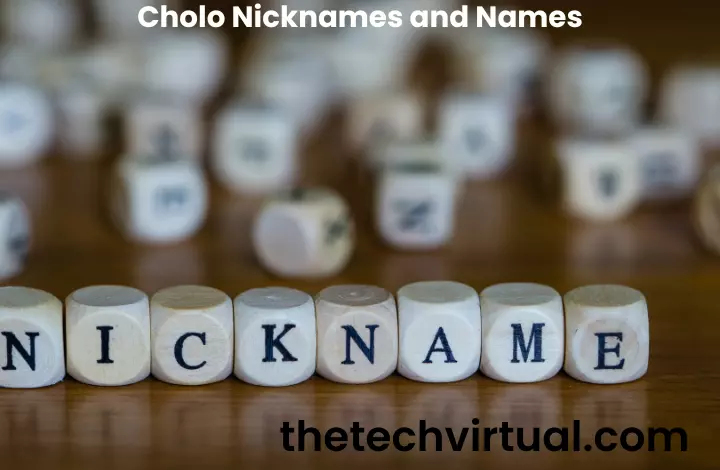Exploring the Varied and Unique Cholo Nicknames and Names

It’s always interesting to explore the different ways that people express themselves through language, and cholo nicknames and names are no exception. Cholos (or Cholas) – a term used to refer to Mexican-American street gangs – often adopt nicknames or alter their given names to reflect their identity, culture, and personal style. In this blog post, we will explore the different types of cholo nicknames and names, and learn how they are used as a form of self-expression.
Introduction of cholo nicknames and names
Cholo nicknames and names are an integral part of Latin American culture and have been used for centuries as terms of endearment. A cholo name is derived from the Spanish word ‘cholo’, which has various meanings in Latin American countries, including ‘neighborhood’ and ‘homie’. Cholo nicknames often contain a reference to a particular element of the culture, such as a neighborhood, a food, or a physical characteristic.
Some of the most popular cholo nicknames and names in the English (UK) language are Chico, Chuy, Gato, Pancho, Lucho, Primo, Pepe, and Chava. These names are often used as terms of endearment, with the person being addressed usually being called ‘mi cholo’ (my cholo). In some cases, however, cholo nicknames can also be used to denote something negative, especially when describing a person’s behavior or attitude.
Cholo nicknames and names are still commonly used today and are a great way to show love and affection for someone or to express something negative. They are an important part of Latin American culture and can help to add a bit of spice to any conversation. Whether you’re looking for a term of endearment or a way to express something negative, cholo nicknames and names are sure to fit the bill.
What is the Origin of Cholo Nicknames?
Cholo nicknames are an important part of Spanish-speaking street culture. Derived from traditional Spanish-speaking cultures, these nicknames often have a humorous or derogatory connotation and are used as a form of social identity. Some of the more common cholo nicknames include “OG” for “Old Gangster,” “Lil Loco” for “Little Crazy,” and “Chiquito” for “Little One.”
In English-speaking countries, cholo nicknames have become more than just a way to describe someone with a strong sense of self-confidence. They have been adopted as terms of endearment, and many non-Spanish speakers have adopted them as a way to honor their heritage. Whether used to describe someone with an unshakable sense of self or as a term of endearment, cholo nicknames are an important part of Spanish-speaking street culture.
What are Some Common Cholo Nicknames?
Cholo is a term used to refer to a unique style of dress and attitude associated with people of Latin American heritage. It is often used as a sign of pride and identity, and this is reflected in the nicknames used within the culture.
Nicknames are often used to differentiate between members of the cholo culture, and some of the most popular nicknames include Tío (meaning uncle, often used for an older member of the group), Chavo (meaning boy, often used for a younger member of the group), Cholo (a term of endearment, used for anyone regardless of age), Güero (meaning blond, often used for someone with lighter hair), Chola (meaning girl, often used for a female member of the group), Primo (meaning cousin, often used for a close friend) and Viejo (meaning old man, in English often used for an elderly member of the group).
These nicknames are important within the cholo culture, as they create a sense of belonging and demonstrate a shared identity. They are also a way of showing respect and admiration for the people within the group. The nicknames can be seen as a mark of honor, and they often represent the relationships and bonds that exist within the culture.
Nicknames are an important part of the cholo culture, and they offer a way for people to connect and show their appreciation for each other. They are also a great way to recognize the uniqueness of the culture and the individuals within it.
Are There Any Differences Between Cholo Nicknames and Names In English (UK) Language?
.
Cholo nicknames are widely used and recognized by Mexican Americans in the United States and beyond. This type of nickname is derived from the Spanish language and often contains creative and unique spellings. As such, they are often gender specific and can have multiple meanings. In contrast, English (UK) names are often derived from the English language, come from a variety of cultures, and are generally spelled as they are pronounced. These names are usually gender-neutral and have a single meaning.
Cholo nicknames are a fun way to express one’s identity and culture. They are often used to show affection, respect, and admiration for a person or group. For example, the nickname “Cholo”, a common cholo nickname, is often used to show admiration for a person’s strength and courage. Similarly, the nickname “Mijo” is often used to show affection for a child or a close friend.
The popularity of cholo nicknames has grown over the years, and they can be seen in many different contexts. For example, they are often used in movies and television shows, and they are also used as a way to show support for a particular team or athlete. In addition, they are often found in music and literature.
Whether you want to show your own cultural identity, express your admiration for someone, or just have a bit of fun, cholo nicknames are a great way to do it. With their creative spellings and multiple meanings, these nicknames are a great way to express yourself.
Are Cholo Nicknames Still In Use Today?
Cholo nicknames, or caló, are still a popular way to express familiarity, respect, and affection among people of Mexican or Latin American descent living in the United States, Mexico, and other parts of Central and South America. Popular terms used to describe a friend or family member include “Baboso”, “Chato”, and “chingón”.
In the United Kingdom, particularly in London, the term “cholo” has come to refer to a type of street style and attitude that is popular among young people of Latin American descent. Cholo nicknames are also used in many English-speaking countries, including Canada, Australia, and New Zealand. Here, the term “cholo” is used to refer to a person of Latin American descent who has adopted a certain style of dress and attitude.
No matter where you are, cholo nicknames are a great way to show respect and affection for someone you care about. Whether you are in the United States or the United Kingdom, these terms are a unique and meaningful way to show someone that you appreciate and care for them.
Are There Any Rules for Choosing a Cholo Nickname?
Cholo nicknames and names have been around for generations. They are an important part of many cultures and are often used to represent a person’s identity and character. It is important for a cholo nickname to be easy to remember and pronounce, as well as unique and not too similar to an existing nickname. It is also important to avoid nicknames that may be offensive or have negative connotations. Respectful nicknames that are offensive to other cultures and languages should be used.
When choosing a cholo nickname, it is important to consider the person’s personality and characteristics. Cholo nicknames often reflect a person’s traits and can be used as a way to show pride in one’s culture. Some popular cholo nicknames include “Cabron”, “Chicano”, “Cholo”, “Tigre”, and “Vato”.
A cholo name or nickname should be carefully chosen to reflect the individual’s personality and character. It should also be respectful to other cultures and languages. By taking the time to choose the right nickname, a person can show pride in their culture and establish a unique identity.
Conclusion
Cholo nicknames are an important aspect of the culture for many Latin American and Hispanic individuals. They are often used to identify, honor, recognize, and distinguish members of the community, providing a sense of belonging and identity. Nicknames are often based on characteristics, physical attributes, or even a person’s profession.
In English (UK) language, cholo nicknames are usually translated to terms such as ‘homie’, ‘gringo’, or ‘Papi’. While these terms may seem disrespectful to some, they are terms of endearment and respect when used in the right context. It is important to be mindful of cultural differences and be respectful of the language and nicknames used by individuals from different backgrounds.
Cholo nicknames can be a way to show respect and affection for a friend or family member. They can also be a way of expressing solidarity and loyalty to a particular group or community. By understanding the importance of cholo nicknames in Hispanic culture, individuals can become more aware of the importance of respecting and honoring other cultures.






